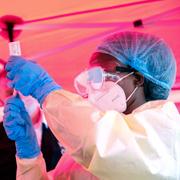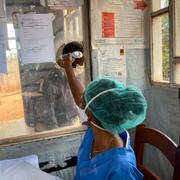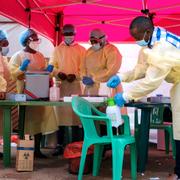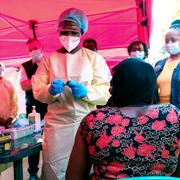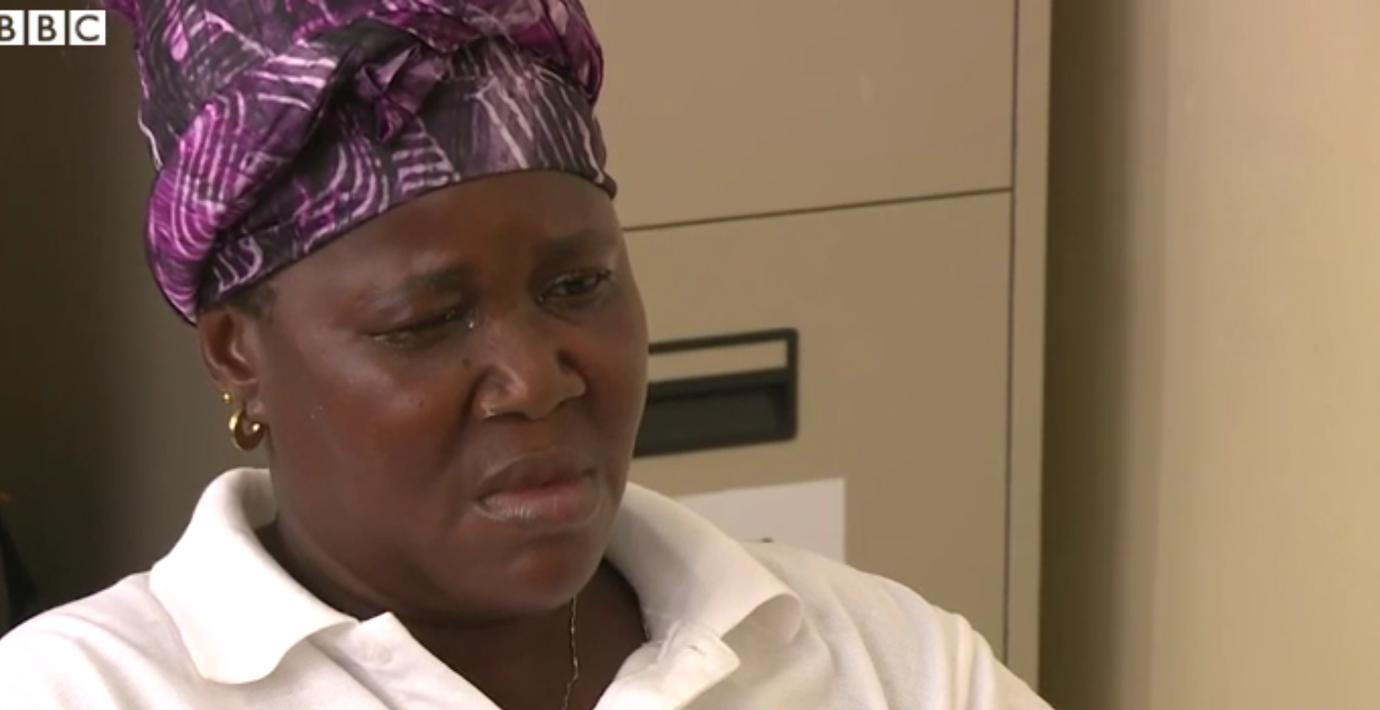
Ebolaoffer kämpar fortfarande med sviterna
Många ebolapatienter som överlevde utbrottet 2014 lider av fysiska och psykiska problem, rapporterar BBC. Kanalen har träffat en överlevargrupp som samlas varje vecka i Sierra Leones huvudstad Freetown för att få stöd och klara av livet i sviterna av sjukdomen, som exempelvis synbortfall.
– Jag mår inte bra alls, jag har fruktansvärt ont i mina ögon, säger en av kvinnorna till BBC.
Det gäller att försöka fira livet. De här kvinnorna är överlevare, men deras mod är samtidigt en mask för att värja sig från enorma förluster, säger BBC:s reporter i inslaget.
bakgrund
Ebolautbrottet i Väsafrika
Wikipedia (en)
The most widespread epidemic of Ebola virus disease (commonly known as "Ebola") in history is currently ongoing in two West African countries. It has caused significant mortality, with reported case fatality rates of up to 70% and specifically 57–59% among hospitalized patients. Ebola virus disease was first described in 1976 in two simultaneous outbreaks in South Sudan and Democratic Republic of the Congo; this is the 26th outbreak in history and the first to occur in the West African subcontinent. The outbreak began in Guinea in December 2013 and then spread to Liberia and Sierra Leone. A small outbreak of twenty cases occurred in Nigeria and one case occurred in Senegal. Several cases were reported in Mali, and an isolated case occurred in the United Kingdom and another in Sardinia. Imported cases in the United States and Spain led to secondary infections of medical workers but did not spread further. Liberia was officially declared Ebola-free in May 2015, however new cases were reported in late June and early July. Following these isolated cases, Liberia was again declared by the WHO to be free of Ebola on 3 September 2015. As of 25 October 2015, the World Health Organization (WHO) and respective governments have reported a total of 28,575 suspected cases and 11,313 deaths, though the WHO believes that this substantially understates the magnitude of the outbreak.
This is the first Ebola outbreak to reach epidemic proportions; past outbreaks were brought under control within a few weeks. Extreme poverty, a dysfunctional healthcare system, a mistrust of government officials after years of armed conflict, and the delay in responding to the outbreak for several months have all contributed to the failure to control the epidemic. Other factors include local burial customs that include washing of the body after death and the spread to densely populated cities. As the disease progressed, many hospitals, short on both staff and supplies, became overwhelmed, and closed, leading some health experts to state that the inability to treat other medical needs may have been causing "an additional death toll [that is] likely to exceed that of the outbreak itself". Hospital workers, who work closely with the highly contagious body fluids of the diseased, have been especially vulnerable to catching the disease. In August 2014, the WHO reported that ten percent of the dead had been healthcare workers. In September 2014, it was estimated that the countries' capacity for treating Ebola patients was insufficient by the equivalent of 2,122 beds; by December there were a sufficient number of beds to treat and isolate all reported Ebola cases, although the uneven distribution of cases was resulting in serious shortfalls in some areas. On 28 January 2015, the WHO reported that for the first time since the week ending 29 June 2014, there had been fewer than 100 new confirmed cases reported in a week in the three most-affected countries. The response to the epidemic then moved to a second phase, as the focus shifted from slowing transmission to ending the epidemic. On 8 April 2015, the WHO reported a total of only 30 confirmed cases, and the weekly update for 29 July reported only seven new cases, the lowest total in more than a year.
On 8 August 2014, the World Health Organization declared the outbreak a public health emergency of international concern. The WHO has been widely criticised for its delay in taking action to address the epidemic. By September 2014, Médecins Sans Frontières/Doctors Without Borders (MSF), the non-governmental organization (NGO) with the largest working presence in the affected countries, had grown increasingly critical of the international response. Speaking on 3 September, the president of MSF spoke out concerning the lack of assistance from the United Nations member countries saying, "Six months into the worst Ebola epidemic in history, the world is losing the battle to contain it." In a 26 September statement, the WHO said, "The Ebola epidemic ravaging parts of West Africa is the most severe acute public health emergency seen in modern times" and the Director-General, Margaret Chan, called the outbreak "the largest, most complex and most severe we've ever seen". In March 2015, the United Nations Development Group reported that due to a decrease in trade, closing of borders, flight cancellations, and foreign investment and tourism activity fuelled by stigma, the epidemic has resulted in vast economic consequences in both the affected areas and even throughout African nations that experienced low or no cases of Ebola.
On 31 July 2015, the WHO announced "an extremely promising development" in the search for an effective vaccine for Ebola disease. While the vaccine up to now shows 100% efficacy in individuals, more conclusive evidence is needed on its capacity to protect populations through what is called herd immunity.
In August 2015, after substantial progress in reducing the scale of the epidemic, the WHO held a meeting to work out a "Comprehensive Care Plan for Ebola Survivors" and identify research needed to optimize clinical care and social well-being. Saying "the Ebola outbreak has decimated families, health systems, economies, and social structures", the WHO called the aftermath "an emergency within an emergency." Of special concern is recent research that shows some Ebola survivors experience so-called Post-Ebola Syndrome, with symptoms so severe that survivors may require medical care for months and even years.
On 7 October 2015, all three of the most seriously affected countries recorded their first joint week without any new cases, raising hopes that the epidemic might finally be coming to an end.
Freetown:
Omni är politiskt obundna och oberoende. Vi strävar efter att ge fler perspektiv på nyheterna. Har du frågor eller synpunkter kring vår rapportering? Kontakta redaktionen
